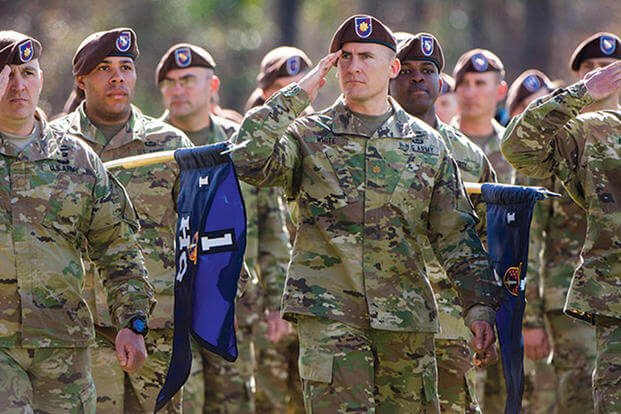Army's Senior Officer Ranks Are Not Diverse Enough, General Says
Jul 1, 2020

Photo Credit: US Army photo
Maj. Jacob E. White salutes during pass in review 8 February 2018 as part of the activation ceremony for the 1st Security Force Assistance Brigade at Fort Benning, Georgia
As the military wrestles with racial inequities in the ranks, the general in charge of Army Training and Doctrine Command (TRADOC) acknowledged Tuesday that the senior officer corps is not as diverse as it should be.
Speaking at an Association of the United States Army virtual event, Gen. Paul Funk II agreed that the general officer ranks do not represent the demographics of the country when compared to the enlisted force.
"First of all, we've got to recognize the diverse talent that we have, and put them in the proper positions, so that they can succeed," Funk said.
Out of the 13 active Army four-star generals, one is Black: Gen. Michael Garrett, commander of Army Forces Command. Of the 296 general officers in the active Army, 43 are Black, 21 are female and six are Hispanic as of April 30, Army spokesman Lt. Col. Emanuel Ortiz told Military.com.
"It's not about handing something out; it's about taking and seizing an opportunity and driving toward a solution," Funk said.
Funk's comments came on the first day of the Army's National Hiring Days, a massive, three-day recruiting event with a target of contracting 10,000 new recruits into the service. But in the larger picture, it's a time of civil strife in the country, punctuated by nationwide protests over the death of George Floyd, a Black man who died May 25 after being taken into custody by Minneapolis police.
In response to the situation, Army senior leaders last week launched Project Inclusion, an effort to reduce opportunities for unconscious bias, such as the requirement of official photos in the officer promotion process.
In the near-term, Funk said the Army has already begun taking steps trying to improve diversity throughout the officer ranks.
Maj. Gen. John Evans, commander of Army Cadet Command, has created an urban recruiting office to bring diverse officer candidates in the Army from Huston and Los Angeles, Funk said.
"What he is trying to do is find great young talent that wants to come and be part of the officer corps," Funk said.
The Army is also in the process of changing its officer promotion system and the officer assignment system, Funk said.
"We are doing that now; the Talent Management Task Force has done remarkable work in looking at diversity and how we are going to start changing assignment preferences to look for more opportunity ... for everyone really," Funk said.
Another element of Project Inclusion is a new dialogue with soldiers across the Army to discuss issues like race and discrimination.
"What we are going to do is have this very serious conversation about our profession, about what it means to serve in the Army and about what it means to be a person of color in our Army, what it means gender-wise etc. and it's got to be at the individual level," Funk said.
"And what we should see from our leadership is talking to the young troopers and them responding 'Ok, I now understand what it is we are trying to get done.'"
-- Matthew Cox can be reached at matthew.cox@military.com.
Read the full article here.









